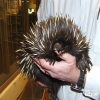Tachyglossus aculeatus
The short-beaked echidna has a head and body length of about 12 to 18 inches. They weigh between 5.5 to 17.6 pounds. Males are 25% larger then females.
The spiny coat provides an excellent defense. When suddenly disturbed on hard ground an echidna curls up into a spike covered ball. If disturbed on soft soil it may dig rapidly straight down, like a sinking ship, until all that can be seen are the spines of the well-protected back. Their sense of hearing is very good, and they can hear humans approaching and take cover long before they can be seen.
Food is located by sense of smell. Adult echidnas do not have teeth. The tongue is covered in sticky saliva that helps them capture insects.
Short-beaked Echidnas are solitary animals, inhabiting a home range which varies in size depending on the environment. A female incubating an egg or suckling young has a fixed burrow. Young echidnas are called ""puggles."" A puggle lives in its mother's pouch for about 3 months, then the mother digs a nursery in the ground. At 7 months the puggle is old enough to leave the nursery. An echidna lays eggs like a chicken, has a pouch like a kangaroo, spines like a porcupine, and slurps up insects with a long, flexible tongue like an anteater.

